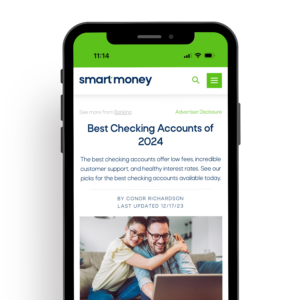Takeaways
- Retail investors are non-professional investors who trade with their own capital.
- Retail investors often trade in smaller amounts or blocks and pay higher fees.
- Retail investors account for 10% or more of the daily trading volume in major indexes.
- Retail investors are estimated to trade up to $30 billion daily, sometimes more.
- The retail market includes individual brokerage accounts, retirement savings, robo-advisors, and more.
Some of the links in this article are from advertising partners of Smart Money, which does not influence our evaluations or recommendations. We work to provide you with accurate and reliable information. Our opinions are our own.
Major stock markets, such as the Nasdaq and NYSE, execute millions of daily trades. Large institutional, or professional investors, place some of these trades, and non-professional, or retail investors, make others.
According to data from the Pew Research Center, roughly 52% of U.S. families are invested in the U.S. public market [1]. Many of these direct or indirect investments in the stock market are made through online brokerage and retirement accounts. While accredited investors make some of these investments, a large part of the daily volume of the stock market is driven by retail investors.
What is a Retail Investor?
A retail investor is a non-professional individual investor who buys and sells financial securities like stocks, bonds, and mutual funds. Retail investors execute their trades from online stock brokerage accounts, retirement savings accounts (like 401(k) or 457(b) plans), or through an investment firm.
Retail investors typically manage their own portfolios, trade with their own capital, purchase relatively smaller blocks of securities, and do not have the resources and volume of investments like institutional investors. You can think of retail investors as everyday investors who have enough discretionary income to start investing for the first time.
Retail investors believe owning individual stocks is the best asset class to generate short-term and long-term returns [2]. Retail investors in their 40s or younger are generally more tech-savvy, invest from mobile apps like Acorns, are willing to invest in cryptocurrencies, and plan on investing more soon.
Retail investors often invest on a much smaller scale than institutional investors, but they are vital to the financial markets because they contribute to liquidity and pricing efficiency.
Get Smart With Your Money
Fresh weekly articles delivered straight to your inbox.
Enter your name and email for free tips and tricks.

What are Institutional Investors?
One of the easiest ways to grasp the concept of a retail investor is to contrast them with institutional investors. Institutional investors are professional money managers. These funds are the major players in the stock market, driving most stock market trades through online trades and sophisticated algorithms. They also represent massive pools of capital.
Institutional investors are the money managers who invest on behalf of:
- Pension Funds
- Hedge Funds
- Insurance Companies
- Private Equity Groups
- University Endowments
- Retirement Funds
Institutional money is often called "smart money" because it is typically funded by a highly sophisticated staff of portfolio managers, researchers, traders, and industry experts with an edge. Because of this specialization in investing, they can amass market intelligence and use that to their advantage. However, if you have funds in a fund they manage, they do this at your behest, and you benefit from their investment returns.
Learn More -> Should You Max Out Your 401(k) Contributions?
Smart Tip:
The Securities and Exchange Commission (SEC) regulates retail and institutional investors to monitor market manipulation, insider trading, or other securities fraud. The SEC also advocates for retail investors to ensure they are not at “the end of the line” when it comes to stock value creation, access, and reliable information [3].
Retail Investment Market
Technological advancements and shifts in consumer behavior have significantly changed the retail investment market. The rapid adoption of digital trading and investment platforms has democratized access to financial markets. Retail investors now have more direct control over their investments, and investing platforms like Acorns, Robinhood, and E*TRADE offer user-friendly interfaces that attract a much broader base of non-professional investors.
These platforms have increased market access, transformed investor behavior, and provided investors with more information about companies, stocks, and bonds. Over half of younger retail investors invest with their mobile phones. During the 2020 Covid-19 pandemic, there was a significant uptick in retail investing. Meme stocks drew in even more retail investors previously sitting on the sidelines.
Mobile apps and online platforms now provide comprehensive market data and educational resources that were previously unavailable. Retail investors are now becoming more informed and engaged, as evident by the surge in daily trading volume.
Now, retail investors can access equity analyst reports on individual companies through their online stock brokerage accounts research portal and other sources, which has expanded their access to information. With the retail investment market expanding, many online investment platforms now offer low investment minimums or transfers, promotions for transferring funds, and waiving trading fees to attract more customers.
What Investments Can Retail Investors Make?
Retail investors have a buffet of investment options. Each investment caters to different risk profiles, investment horizons, and financial goals. Here are some of the primary types of investments that retail investors can consider:
- Individual Stocks: Buying stocks or equities gives investors a share of ownership in a company. Stocks are well-understood securities, and many retail investors dip their toes into investing by purchasing stocks for the first time. Stocks have the potential for high returns but a higher risk, especially in the short term. Read more about how to buy your first stock.
- Bonds: Bonds are fixed-income investments where the investor loans money to a corporate or government entity that borrows the funds for a defined period at a fixed interest rate. Read more about the different types of bonds.
- Mutual Funds: Mutual funds pool capital from many investors to purchase a defined set of stocks, bonds, or other securities. Mutual funds can specialize in industries, geographies, asset classes, and market capitalization. Mutual funds are known to provide retail investors with diversification. Read more about investing in mutual funds.
- Exchange-Traded Funds (ETFs): ETFs are similar to mutual funds. They are traded on stock exchanges like ordinary stocks, and an investor can buy or sell an ETF throughout the trading day. ETFs have advantages over mutual funds, such as low expense ratios and tax efficiency. Read more about investing in exchange-traded funds.
- Real Estate: Investors can also invest in property directly or through real estate investment trusts (REITs). REITs offer exposure to real estate markets without requiring you to own, manage, or finance properties. Read more about how to get started investing in real estate.
- Cryptocurrencies: A newer investment class is cryptocurrencies, which involve digital or virtual tokens or coins that use cryptography for security. One of the most popular cryptocurrencies is Bitcoin, which was founded in 2009. Read more about the top cryptocurrency platforms.

Coinbase Website
Coinbase
Smart Money Rating: 4.5/5
Best For: Investing in Crypto
Bonus Offer: Buy Bitcoin from just $10
Retail Investors vs. Institutional Investors
Retail and institutional investors differ significantly in their approach, resources, and impact on the financial markets.
The most significant difference is that an institutional investor is a company (such as a C Corporation or Limited Liability Company) or an organization that invests on behalf of others (sometimes even retail investors). Retail investors, however, are "natural persons" who invest their own money.
Institutional investors manage large pools of money; some manage billions of dollars. Retail investors, trading from their accounts, invest smaller amounts. This is often from their own retirement savings or online stock brokerage account. Retail investors invested in more accessible markets like public stocks, bonds, and mutual funds. They use a more personal investment strategy and don't rely on a team of finance professionals assessing investments like institutional investors.
Learn More -> 5 Reasons to Talk to a Financial Advisor
Due to their trading volumes, institutional investors can significantly influence market prices and trends. Retail investors trade less frequently and in smaller quantities, so their market influence is much more limited compared to these institutional entities.
Another difference is that institutional investors typically aim for long-term growth, so they are less affected by short-term market volatility. Retail investors often seek quicker returns. Their investments can be more sensitive to market ups and downs.

Acorns Website
Acorns Investing App
Intro Offer: $20 Bonus Investment
Recommended For: Beginner Investors
Annual Fee: N/A
Smart Money Rating: 5/5
Criticisms of Retail Investors
Investing in stocks can be one of the fastest ways to accelerate your net worth, and investing in indexes like the S&P 500 has produced annualized rates of return of 10.3% over the past decade [4]. Retail investors looking for a piece of that return have started to flock to the markets. Here are several criticisms of retail investors:
- Lack of Knowledge and Experience: Retail investors are individual players and often lack the professional training and resources that institutional investors have. This can lead to less informed decision-making.
- Influenced by Emotions: Retail investors are more likely to be influenced by emotions or media frenzies. This influence can lead to irrational financial decisions like panic selling during market turndowns or excessive buying in speculative bubbles.
- Vulnerability to Market Risks: Because of retail investors' limited experience and resources, they are often more vulnerable to market turndowns. As a retail investor, you may not have diversified portfolios, which can lead to higher risks and potential losses.
Get Smart -> What is an Initial Public Offering?
Smart Summary
Retail investors are essential to the health of stock markets. As individual investors and traders, they provide much-needed liquidity and support for the stock market. You might be a retail investor if you invest directly in stocks, bonds, mutual funds, ETFs, and other investments. You might also be a benefactor of institutional investing if you have a retirement savings plan managed through pension funds or another large money manager, such as your 401(k) plan. A healthy retail investor market can drive optimism and market exuberance. Read more about how to set up your online stock brokerage account to get started investing.
(1) Pew Research Center. More than half of U.S. households have some investment in the stock market. Last Accessed April 23, 2024.
(2) BNY Mellon. The State of the U.S. Retail Investor: Insights & Implications. Last Accessed April 23, 2024.
(3) Securities and Exchange Commission. Remarks at the Meeting of the SEC and Investment Advisory Committee (IAC). Last Accessed April 23, 2024.
(4) S&P 500. 10 Year Annualized Return Dates: April 23, 2024 – April 2004. Last Accessed April 23, 2024.










